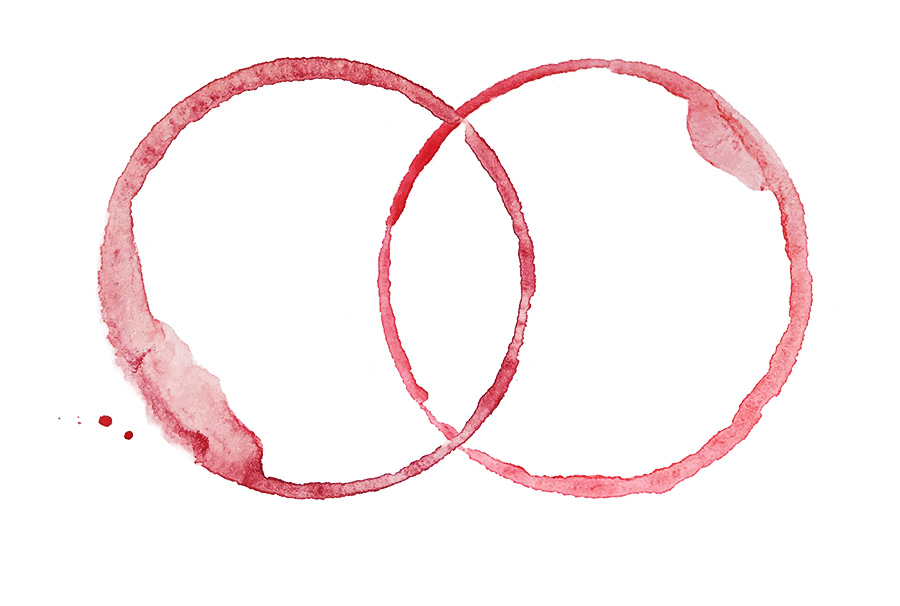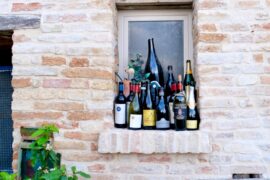Maybe young love is sweet. The poets tell us so, but I don’t remember. Old love sure isn’t sweet. It’s complicated. It’s savory, sometimes bitter, highly evolved. Old love is not fresh petals and candy hearts. Old love is steak and black coffee.
Old love needs a mature wine. Not a Cupid wine, but a Bacchus wine. A wine with spine and nerve, minerals, grip. A wine that’s true, unvarnished, authentic, complex.
This is probably why vintage Champagne is the quintessential Valentine’s Day wine. It’s complicated enough to begin with, then gets more interesting with the embellishments of age. Sure, it has some sweetness, and some nuttiness and fizz, but what relationship doesn’t? It’s extrinsically fun, appealing in youth, but can also be intrinsically interesting, appealing in age.
Old love needs a wine with personality, fully evolved. Because let’s face it, once you hit a certain age, you’ve got some quirks. You must learn to love each other’s quirks, or at least live with them. Old love needs a wine that reminds us nobody’s perfect.
Old love needs Barolo. It’s utterly unlikeable in youth, a good reminder that the kids don’t always have the most fun. It’s a beautiful, serious, enduring wine, at first bitter and leathery, all tar and earth and the blackness of silence, and then, just as you are peering over the rim of it, seeking infinity, it suddenly snatches you back to tell you that springtime—violets! cherries!—always comes again. Barolo reminds you of mortality, then immortality, over and over.
Old love needs old Riesling, with its not-quite-pleasant slick of oil and minerals and salt shimmering beneath a shower of white petals and citrus. It is luminous, it has a sheen, it can be opulent (rarely corpulent), but it can also be stony and quiet and stoic. It is like the moment of sitting together when there is nothing to say, but you each know what the other would say.
Old love needs Chablis, because it is anchored in the mineral foundation of the earth, and this reminds us that there is something deeper and older even than our old love.
Old love needs tawny Port, because it is old like us and still makes us laugh.
Old love needs Burgundy, because it is both terrifying and thrilling.
Old love doesn’t need a lovable wine. In fact, it’s a good idea to find a wine you don’t love. This is guaranteed to feel compelling in some way, and will also negate I-am-not-a-person-who thinking. As in, I am not a person who likes white wine. I am not a person who likes Chardonnay. Drink some Chardonnay! (Champagne, or Chablis.) Seek a wine that asks you to become a different person when you taste it. Revisiting old concepts about what you like and what you don’t like lets you step outside the fences you have constructed around your tastes. Even a wine you don’t love might spark something in you, might remind you of what you do love.
This is also the lesson of long relationship. You must step outside of yourself sometimes, and together you must also step outside of the boundaries you have proscribed for yourselves as a couple. Even though your love is old, you must try something new once in a while, something to remind you that there’s a big world out there for the taking, together.
Many thanks to Wine Business and Wine Industry Insight for recommending this article to their readers.





Reminds me of Terry Theise saying that he was more interested in wines that ask questions rather than give answers. Wines that compel rather than demand make for much more enduring experiences.
Terry is a wise man.
Meg, I love this post… the title alone! Great…
Thanks so much, Jeremy.
This is brilliant. Sharing (is caring) it. “Old love is steak and black coffee.” <– best line ever. "Old love needs Burgundy, because it is both terrifying and thrilling." <— Also great.
Happy Valentine’s Day, Kerry.
Same to you, Meg.